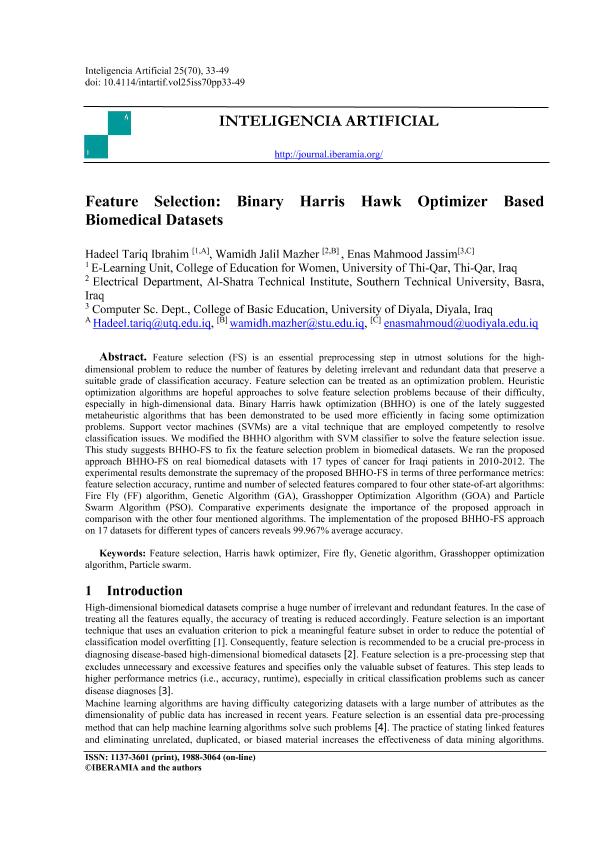| LDR | | | 00000cab a2200000 4500 |
| 001 | | | MAP20220034753 |
| 003 | | | MAP |
| 005 | | | 20221124085218.0 |
| 008 | | | 221124e20221205esp|||p |0|||b|eng d |
| 040 | | | $aMAP$bspa$dMAP |
| 084 | | | $a922.134 |
| 100 | 1 | | $0MAPA20220009546$aTariq Ibrahim, Hadeel |
| 245 | 1 | 0 | $aFeature Selection: Binary Harris Hawk Optimizer Based Biomedical Datasets$cHadeel Tariq Ibrahim |
| 520 | | | $aFeature selection (FS) is an essential preprocessing step in utmost solutions for the high-dimensional problem to reduce the number of features by deleting irrelevant and redundant data that preserve a suitable grade of classification accuracy. Feature selection can be treated as an optimization problem. Heuristic optimization algorithms are hopeful approaches to solve feature selection problems because of their difficulty, especially in high-dimensional data. Binary Harris hawk optimization (BHHO) is one of the lately suggested metaheuristic algorithms that has been demonstrated to be used more efficiently in facing some optimization problems. Support vector machines (SVMs) are a vital technique that are employed competently to resolve classification issues. We modified the BHHO algorithm with SVM classifier to solve the feature selection issue. This study suggests BHHO-FS to fix the feature selection problem in biomedical datasets. We ran the proposed approach BHHO-FS on real biomedical datasets with 17 types of cancer for Iraqi patients in 2010-2012. The experimental results demonstrate the supremacy of the proposed BHHO-FS in terms of three performance metrics: feature selection accuracy, runtime and number of selected features compared to four other state-of-art algorithms: Fire Fly (FF) algorithm, Genetic Algorithm (GA), Grasshopper Optimization Algorithm (GOA) and Particle Swarm Algorithm (PSO). Comparative experiments designate the importance of the proposed approach in comparison with the other four mentioned algorithms. The implementation of the proposed BHHO-FS approach on 17 datasets for different types of cancers reveals 99.967% average accuracy.
|
| 540 | | | $aLa copia digital se distribuye bajo licencia "Attribution 4.0 International (CC BY NC 4.0)"$f$uhttps://creativecommons.org/licenses/by-nc/4.0$964 |
| 650 | | 4 | $0MAPA20080611200$aInteligencia artificial |
| 650 | | 4 | $0MAPA20080553128$aAlgoritmos |
| 773 | 0 | | $wMAP20200034445$g05/12/2022 Volumen 25 Número 70 - diciembre 2022 , p. 33-49$x1988-3064$tRevista Iberoamericana de Inteligencia Artificial$d : IBERAMIA, Sociedad Iberoamericana de Inteligencia Artificial , 2018- |
| 856 | | | $qapplication/pdf$w1118278$yRecurso electrónico / Electronic resource |


